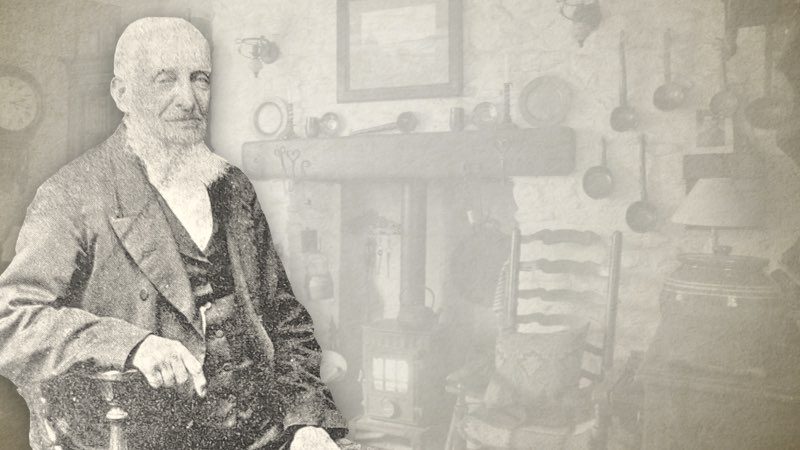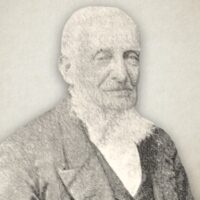
The Life And Ministry Of Edward Debnam
Earthen Vessel 1898:
The Late Mr. Edward Debnam
On Lord’s-day, September 4th, Mr. Edward Debnam passed away at his residence at Botisham Lode, near Cambridge, at the advanced age of 82 years. Although for some time past the health of the deceased had been gradually failing. the news of his sudden death caused us great surprise. On the morning of his decease, awaking early, he appeared as well as usual. Falling asleep again he was heard to utter one groan, which was the only sign of the passing of his spirit from earth to heaven.
For many years Mr. Debnam has been known to several of the Strict Baptist Churches as a faithful and fearless preacher of the Gospel of the grace of God.
When a young man, he became a member of the Baptist Church at Chelmsford. Soon after this he became possessed with an intense desire to be engaged in the work of preaching the Gospel. We have heard him relate with pleasure how that after a season of severe anxiety concerning his call to the ministry, he received a direct answer to prayer, a message from the Master. Expecting to hear a strange minister, he had prayed that some word might be spoken in confirmation of the Divine call which he felt he had received.
The preacher announced as his text the words, “Go, stand and speak in the temple to the people all the words of this life” (Acts 5:20). The sermon throughout was listened to by Mr. Debnam with rapt attention. His convictions were thoroughly strengthened. Numerous opportunities offering themselves, from this time he was constantly engaged in the Lord’s work, almost until the time of his death.
During the course of his ministry, he sustained three pastorates, viz., at Maldon, in Essex; at Sudbury, in Suffolk; and at Saxlingham, in Norfolk. Relinquishing pastoral duties, he removed into Cambridgeshire, and for several! years itinerated.
The announcement of his death will recall to many, memories of his tall, upright figure, and of his solemn, and venerable, yet pleasant face. The congregations to whom he ministered were composed chiefly of elderly people, most of whom were established Christians.
His ministry was doubtless used more to the comforting of saints than to the conversion of sinners, clinging tenaciously to the good old ways and the grand old doctrines; being a pronounced man of truth, he had no sympathy with either modern methods, nor modern notions. The one absorbing desire of his life was to know and to preach the “truth as it is in Jesus.” Towards the close of his life his delight was to meditate upon the greatness and the glory of the Redeemer’s work and Person. As he was nearing the end of his journey, he cared less for Christian controversy, but much more for Christian communion. The funeral took place at the Chelmsford Cemetery, at which Mr. S. J. Bland kindly officiated. After an appropriate address by Mr. Bland, those present, according to the wish of the deceased, joined in singing the well-known hymn, commencing:—
“When I survey the wondrous cross,
On which the Prince of Glory died.”
In full assurance of a glorious resurrection, we committed the remains of our beloved friend to the keeping of the tomb. We are looking forward to the time of reunion when, with the host of the redeemed, in the likeness of Christ we shall together see Him face to face.
Thus another labourer in the Master’s vineyard has enterer! upon that eternal rest remaining for the people of God. For several years it was a source of great joy to the deceased to know that, while he was preaching the Gospel his son, pastor J. R. Debnam, and grandson, were engaged in the same work. “He, being dead, yet speaketh,” and will, we trust, continue to speak in the generations following.
As we remember the circumstances of his departure, we are reminded how silently and suddenly the messenger of death may come to each one of us. In the brightness of early Sabbath morning, the angel from heaven appeared to conduct the spirit of the departed to the presence of the King.
His end was peace. After a period of fifty years of service and suffering, he sweetly and almost silently fell on sleep.
“Sure the last end
Of the good man is peace! How calm his exit!
Night-dews fall not more gently to the ground,
Nor weary worn-out winds explore so soft.”
E. J. D.
39, Sutherland-square, S. E.
The Late Edward Debnam Of Bottisham Lode
By His Son, W. Debnam
My father was born at Chelmsford, June 24, 1816. He was brought up to attend “the Church” and educated at the day-school.
At an early age he began to work with his father at the boot trade, and followed his calling till age and infirmities compelled him to give up.
As a youth, I have heard him say, he took pleasure with other boys in mischief and sin in its numerous and varied forms.
One Sunday, at the school, his teacher was pointing out the awful consequences of living and dying in sin; to all such hell must be their portion. This filled his mind with fear and terror for some time, but it did not stop him altogether in his downward course.
As he grew up he took a great delight in cricket, and one day, when much older, he went to see a cricket match, and said to the writer, “That is what I delight in,” when the Lord sent home the arrow of conviction into his heart, and made him feel himself to be a lost, ruined, undone sinner, and the words came with power into his soul, “Come ye out from among them, and touch not the unclean thing.” This brought him into such soul trouble that it led him to cry day and night for mercy. His distress of mind was so great that he destroyed his bats and stumps, and took his work into a top room of the house, and told his mother if any of his companions called be could not be seen.
For a long time he was in such bondage that he felt hell must be his portion hereafter. One morning, when at work in his shop, the Lord broke into his soul and showed him the joy of salvation, that he felt he must tell it to his neighbours. All fear of the torments of hell was taken away. He could now see God’s Word was full of blessing, and it brought joy to his heart.
In the providence of God he was led to attend the Old Baptist Chapel, Coggeshall, sixteen miles from Chelmsford. Mr. Rivett was the preacher; here he was baptised.
After a few years he removed his membership to Duke-street, Chelmsford. In 1850 there was a division, and a large room accommodating 200 persons was taken. This was opened by the late Mr. Allen, of Cave Adullam, Stepney. At this time deceased was greatly exercised about the Ministry, so much so, that he was laid aside on a sick bed for some weeks, mother fearing she would be left a widow with four of us. She being in bad health at the time, and for years a prisoner at home, we would sometimes offer to stay with her on the Sunday, but in her quiet, feeling way, would say, “I do not wish it—if, like me, you were compelled, you would not care for it.”
My father was still exercised about the ministry, and one Sunday morning, the late Mr. Dearsley, of Dalston, heard him in prayer and believed he was in trouble about preaching, and gave him a word of encouragement, and he (Mr. D.) asked him to go to Harrow Wield for him to supply.
About this time the late John Corbett settled at Chelmsford, and was instrumental in uniting the friends again in the old Chapel. My father told Mr. Corbett about the exercises of his mind concerning the ministry. Mr. C. replied, “The Lord has a work for you to do.” Soon after he preached his first sermon in a farm house at Roxwell, near Chelmsford, to a few farm labourers, their wives, and children; I was with him at the time.
After preaching in the villages a club-room was hired at Forthend, eight miles from Chelmsford, where he preached morning and afternoon, and on his way home preached in a cottage in the evening at Blasted Hill.
The time came when he was asked to go to Maldon and commenced speaking in a carpenter’s shop. An old Chapel was bought (formerly used by the Wesleyans), a Church formed, and here he entered upon his first pastorate, and remained about eight years.
His second pastorate was Sudbury, Suffolk, where the late Daniel Herbert preached.
His next move was to Saxlingham, Norfolk, then to Swavesey, Cambs; his last place was Bottisham Lode, where he supplied.
Age and infirmities kept pace, and latterly he was only able to supply neighbouring Churches, and on Lord’s-day, September 4, like good old Jacob, he was gathered to his people, as a shock of corn at the ripe age of 82 years.
Like the apostle he laboured, while strength allowed, for the bread which perisheth, and experienced the ups and downs of life, but his chief joy was—
“To tell to sinners round
What a dear Saviour he had found.”
A short time previous to his translation, his old friend, Mr. Cornwell, of Brixton, spent two hours with him, which proved a profitable season to both.
At his funeral, Mr. S. K. Bland, the Suffolk patriarch, kindly and efficiently officiated.
[It was our pleasure to be personally acquainted with deceased, who was a thorough experimental preacher of the Gospel; “he knew what sore temptations meant;” and was acquainted with domestic and other trials; this was one of the schools he passed through in training for the pulpit. This sketch would be incomplete without reference to the fact that one of his sons—Mr. J. R. Debnam has been the honoured pastor of the Church at Horham, Suffolk, for many years.—J. W. B.]
Edward Debnam (1816-1898) was a Strict and Particular Baptist preacher. He served three pastorates—Malden, Essex; Sudbury, Suffolk; Saxlingham, Norfolk. After resigning the pastoral office from the third church, he entered upon an itinerate ministry for the remainder of his years.



